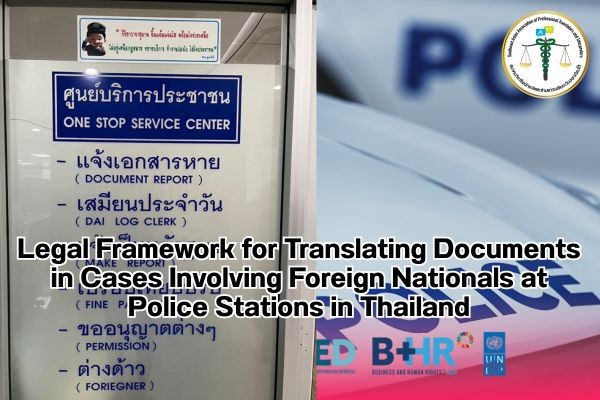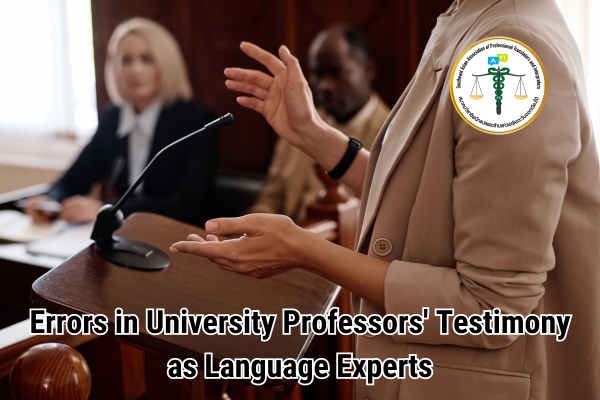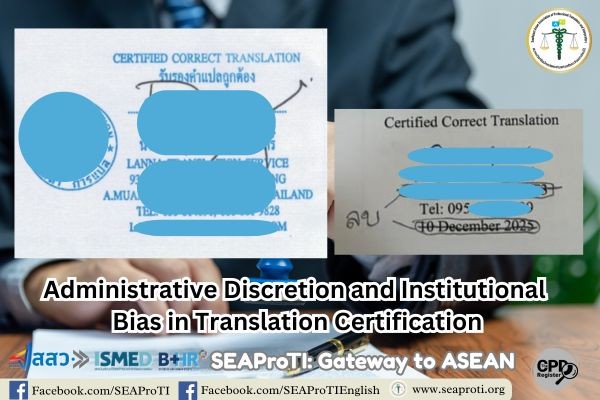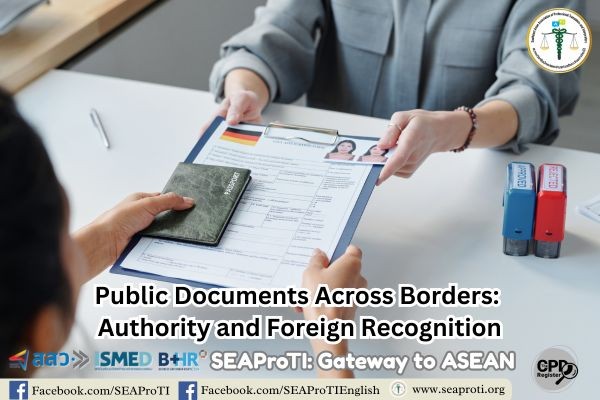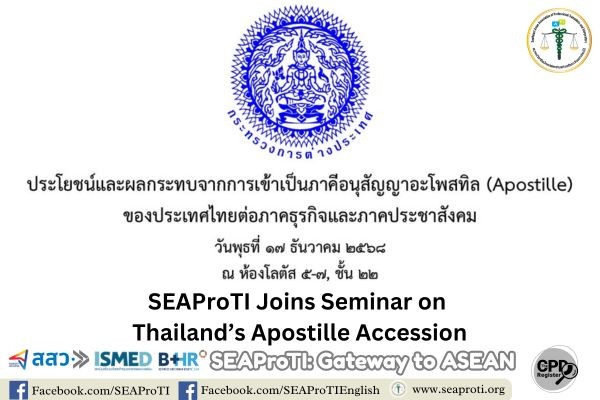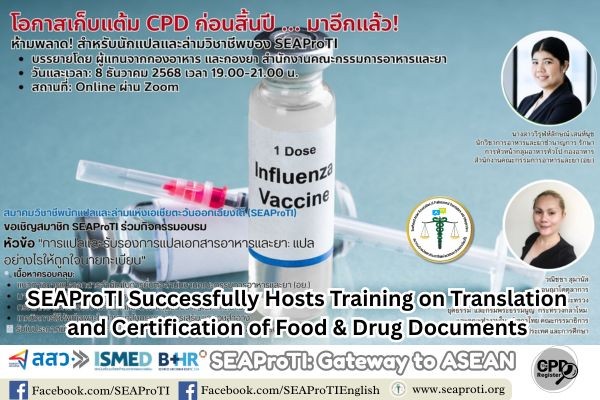Legal Framework for Translating Documents in Cases Involving Foreign Nationals at Police Stations in Thailand
By Wanitcha Sumanat | Southeast Asian Association of Professional Translators and Interpreters (SEAProTI)
Abstract
5 July 2025, Bangkok – Translating documents for use in legal proceedings involving foreign nationals at police stations in Thailand must adhere to specific legal and administrative principles to ensure acceptance by official authorities. This article examines the relevant legal framework, including the Administrative Procedure Act B.E. 2539 (1996) and the Ministerial Regulation on the Certification of Translated Documents B.E. 2540 (1997). It highlights the requirements for professional translators to certify the accuracy of translations and outlines the standards that must be followed for such documents to be considered legally valid in the context of police investigations.
1. Introduction
In legal cases involving foreign nationals, the translation of official documents at the police station is a critical step that can directly impact due process. Translated documents must be accurate, complete, and formally certified in a manner recognized by government authorities to be admissible in criminal investigations and legal proceedings.
2. Legal Status of the Royal Thai Police
The Royal Thai Police is part of the executive branch of government and, at times, operates under the supervision of the Ministry of Justice. Regardless of structural shifts, all administrative agencies must comply with the Administrative Procedure Act B.E. 2539 (1996), which governs the conduct of government officials and administrative processes (Office of the Council of State, 2022).
3. Legal Basis for Document Translation in Public Administration
Document translation submitted to government agencies—including police stations—must comply with the Ministerial Regulation B.E. 2540 (1997) on the Certification of Translated Documents, issued under the authority of the aforementioned Administrative Procedure Act (Royal Gazette, 1997). This regulation mandates that:
- Translated documents must be certified as accurate by a person with appropriate linguistic competence.
- The certification must confirm that the translation is true and complete compared to the source.
- Certification is especially crucial in official and legal contexts, such as police investigations.
4. Requirements for Valid Translation Certification
A legally valid translation should include:
A certification clause such as:
“I hereby certify that the translation is accurate and complete to the best of my ability and corresponds with the original document.”
The translator’s full name, signature, contact information, and the date of certification.
If the translation is to be used in a police investigation or other legal context, it is strongly recommended that the translator be a Certified Translator or Authorized Translation Certifier, registered with a reputable professional body such as SEAProTI (Southeast Asian Association of Professional Translators and Interpreters) (SEAProTI, 2024).
5. Practical Concerns and Recommendations
Failure to comply with these requirements may result in the rejection of the translated document by police officers or investigative authorities, which could jeopardize the rights of foreign nationals involved in the case. Police departments are encouraged to adopt clear guidelines for document translation and to collaborate with certified translators to ensure the integrity of the investigation process. Furthermore, public awareness campaigns should clarify the proper procedures for translation and certification to avoid delays or disputes.
6. Conclusion
The translation and certification of documents for use in cases involving foreign nationals at police stations must comply with the Ministerial Regulation B.E. 2540, which was issued under the authority of the Administrative Procedure Act B.E. 2539. Since the Royal Thai Police is an administrative agency, it is bound by this legal framework. Properly translated and certified documents are crucial to ensure that such evidence is admissible in police investigations and legal proceedings. The role of certified professional translators is indispensable in safeguarding legal rights and procedural fairness in cases involving multilingual participants.
References
- Office of the Council of State. (2022). Administrative Procedure Act B.E. 2539 (1996), revised edition. Bangkok: Council of State Publications.
- Royal Gazette. (1997). Ministerial Regulation on the Certification of Translated Documents B.E. 2540. Volume 114, Special Section 67 Ngor, September 19, 1997.
- Southeast Asian Association of Professional Translators and Interpreters (SEAProTI). (2024). Regulations on Certified Translators and Translation Certifiers. Retrieved from www.seaproti.org
SEAProTI’s certified translators, translation certification providers, and certified interpreters:
The Southeast Asian Association of Professional Translators and Interpreters (SEAProTI) has officially announced the criteria and qualifications for individuals to register as “Certified Translators,” “Translation Certification Providers,” and “Certified Interpreters” under the association’s regulations. These guidelines are detailed in Sections 9 and 10 of the Royal Thai Government Gazette, issued by the Secretariat of the Cabinet under the Office of the Prime Minister of the Kingdom of Thailand, dated July 25, 2024, Volume 141, Part 66 Ng, Page 100. the Royal Thai Government Gazette
หลักเกณฑ์ทางกฎหมายสำหรับการแปลเอกสารที่เกี่ยวข้องกับคดีที่มีชาวต่างชาติ ณ สถานีตำรวจในประเทศไทย
โดย วณิชชา สุมนัส | สมาคมวิชาชีพนักแปลและล่ามแห่งเอเชียตะวันออกเฉียงใต้ (SEAProTI)
บทคัดย่อ
5 กรกฎาคม 2568, กรุงเทพมหานคร – การแปลเอกสารเพื่อใช้ในกระบวนการสอบสวนคดีที่เกี่ยวข้องกับชาวต่างชาติ ณ สถานีตำรวจ เป็นกระบวนการที่ต้องอาศัยหลักเกณฑ์ทางกฎหมายที่ชัดเจน เพื่อให้เอกสารแปลและการรับรองการแปลสามารถยอมรับได้ในทางราชการและกระบวนการยุติธรรมของไทย บทความนี้วิเคราะห์กรอบกฎหมายที่เกี่ยวข้อง ได้แก่ พระราชบัญญัติวิธีปฏิบัติราชการทางปกครอง พ.ศ. 2539 และกฎกระทรวงว่าด้วยการรับรองความถูกต้องของเอกสารแปล พ.ศ. 2540 โดยชี้ให้เห็นถึงบทบาทของนักแปลวิชาชีพในการรับรองความถูกต้องของเอกสาร และข้อควรปฏิบัติเพื่อให้การแปลเอกสารมีผลในทางราชการ
1. บทนำ
การแปลเอกสารเพื่อใช้ในคดีความ โดยเฉพาะกรณีที่มีชาวต่างชาติเกี่ยวข้อง ณ สถานีตำรวจ เป็นภารกิจสำคัญที่เกี่ยวพันกับสิทธิตามกระบวนการยุติธรรมของผู้ต้องหา พยาน หรือตัวแทนจากต่างประเทศ เอกสารแปลจะต้องสามารถยอมรับได้ในเชิงพฤตินัยและนิตินัย โดยเฉพาะอย่างยิ่งเมื่อนำไปใช้ประกอบการสอบสวนหรือการดำเนินคดีในระดับต้นของระบบยุติธรรม ซึ่งเริ่มต้นที่สถานีตำรวจ
2. สถานะทางกฎหมายของสำนักงานตำรวจแห่งชาติ
สำนักงานตำรวจแห่งชาติของไทยจัดเป็นหน่วยงานภายใต้ฝ่ายบริหารของรัฐ ซึ่งอยู่ภายใต้การกำกับดูแลของนายกรัฐมนตรีผ่านทางกระทรวงยุติธรรมในบางช่วงเวลา แม้ในเชิงโครงสร้างอาจมีการปรับเปลี่ยน หน่วยงานในฝ่ายบริหารต้องปฏิบัติตามกรอบกฎหมายที่กำหนดไว้ใน พระราชบัญญัติวิธีปฏิบัติราชการทางปกครอง พ.ศ. 2539 (สำนักงานคณะกรรมการกฤษฎีกา, 2565)
3. หลักเกณฑ์การแปลเอกสารในงานราชการ
เอกสารที่ต้องยื่นต่อหน่วยงานราชการ รวมถึงสถานีตำรวจ จะต้องผ่านกระบวนการแปลและรับรองการแปลตาม กฎกระทรวง พ.ศ. 2540 ว่าด้วยหลักเกณฑ์และวิธีการในการรับรองความถูกต้องของเอกสารแปล ซึ่งตราขึ้นตาม พ.ร.บ.วิธีปฏิบัติราชการทางปกครอง พ.ศ. 2539 (ราชกิจจานุเบกษา, 2540)
กฎกระทรวงฯ ฉบับนี้กำหนดให้การแปลเอกสารที่นำมาใช้กับหน่วยงานราชการ ต้องมีการรับรองความถูกต้องโดยบุคคลผู้มีความรู้ภาษาอย่างเหมาะสม กล่าวคือ ผู้แปลจะต้องมีความรู้ภาษาอย่างเพียงพอ และสามารถรับรองได้ว่าเอกสารแปลนั้นถูกต้องและสมบูรณ์ตามต้นฉบับ
4. การรับรองการแปลที่ยอมรับได้
เพื่อให้เอกสารแปลมีผลตามกฎหมาย ต้องมีลักษณะการรับรองดังนี้:
มีข้อความรับรองความถูกต้อง เช่น
“ข้าพเจ้าขอรับรองว่า ข้อความที่แปลนี้ถูกต้องและสมบูรณ์ตามต้นฉบับ” หรือใช้ตราประทับ
ลงชื่อ-สกุลของผู้แปล วันเดือนปี และที่อยู่ที่สามารถติดต่อได้
หากใช้ในงานราชการหรืองานสอบสวน ควรเป็นการแปลโดย นักแปลรับรอง ที่ขึ้นทะเบียนกับหน่วยงานวิชาชีพ เช่น สมาคมวิชาชีพนักแปลและล่ามแห่งเอเชียตะวันออกเฉียงใต้ (SEAProTI) ซึ่งมีระบบการประเมินคุณสมบัติและใบอนุญาตประกอบวิชาชีพที่ชัดเจน (SEAProTI, 2567)
5. ประเด็นทางปฏิบัติและข้อเสนอแนะ
การไม่ปฏิบัติตามหลักเกณฑ์ข้างต้นอาจทำให้เอกสารแปลไม่สามารถนำไปใช้ในทางราชการหรือถูกปฏิเสธโดยเจ้าพนักงานสอบสวนได้ ซึ่งอาจส่งผลต่อสิทธิในกระบวนการยุติธรรมของชาวต่างชาติ ดังนั้น หน่วยงานตำรวจควรมีแนวปฏิบัติร่วมกับนักแปลรับรอง และประชาสัมพันธ์ต่อสาธารณชนอย่างชัดเจนถึงข้อกำหนดในการแปลและรับรองเอกสาร เพื่อป้องกันความเสียหายและความเข้าใจผิด
6. สรุป
การแปลเอกสารเพื่อใช้ในคดีที่มีชาวต่างชาติเกี่ยวข้อง ณ สถานีตำรวจไทย ต้องอยู่ภายใต้หลักเกณฑ์ของกฎหมายว่าด้วยการปฏิบัติราชการทางปกครอง โดยเฉพาะอย่างยิ่ง กฎกระทรวง พ.ศ. 2540 ซึ่งกำหนดวิธีการรับรองความถูกต้องของเอกสารแปล การเลือกใช้บริการจากนักแปลที่มีคุณสมบัติตามที่กฎหมายกำหนดและสามารถรับรองการแปลได้อย่างถูกต้อง เป็นปัจจัยสำคัญที่จะทำให้เอกสารสามารถยอมรับได้ในกระบวนการสอบสวนและพิจารณาคดี
เอกสารอ้างอิง
สำนักงานคณะกรรมการกฤษฎีกา. (2565). พระราชบัญญัติวิธีปฏิบัติราชการทางปกครอง พ.ศ. 2539 (ฉบับปรับปรุง). กรุงเทพฯ: สำนักพิมพ์คณะกรรมการกฤษฎีกา.
ราชกิจจานุเบกษา. (2540). กฎกระทรวงกำหนดหลักเกณฑ์และวิธีการในการรับรองความถูกต้องของเอกสารแปล พ.ศ. 2540. เล่ม 114 ตอนพิเศษ 67 ง. 19 กันยายน 2540.
สมาคมวิชาชีพนักแปลและล่ามแห่งเอเชียตะวันออกเฉียงใต้ (SEAProTI). (2567). ข้อบังคับสมาคมฯ ว่าด้วยนักแปลรับรองและผู้รับรองการแปล. เข้าถึงจาก: www.seaproti.org
เกี่ยวกับนักแปลรับรอง ผู้รับรองการแปล และล่ามรับรองของสมาคมวิชาชีพนักแปลและล่ามแห่งเอเชียตะวันออกเฉียงใต้
สมาคมวิชาชีพนักแปลและล่ามแห่งเอเชียตะวันออกเฉียงใต้ (SEAProTI) ได้ประกาศหลักเกณฑ์และคุณสมบัติผู้ที่ขึ้นทะเบียนเป็น “นักแปลรับรอง (Certified Translators) และผู้รับรองการแปล (Translation Certification Providers) และล่ามรับรอง (Certified Interpreters)” ของสมาคม หมวดที่ 9 และหมวดที่ 10 ในราชกิจจานุเบกษา ของสำนักเลขาธิการคณะรัฐมนตรี ในสำนักนายกรัฐมนตรี แห่งราชอาณาจักรไทย ลงวันที่ 25 ก.ค. 2567 เล่มที่ 141 ตอนที่ 66 ง หน้า 100 อ่านฉบับเต็มได้ที่: นักแปลรับรอง ผู้รับรองการแปล และล่ามรับรอง


